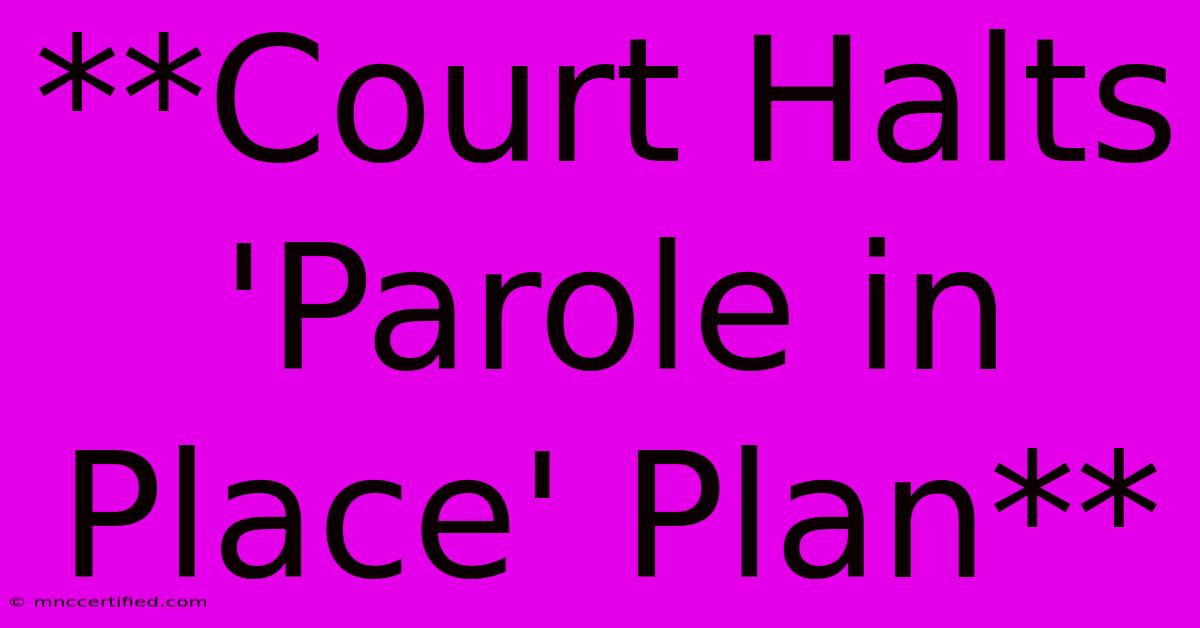**Court Halts 'Parole In Place' Plan**

Table of Contents
Court Halts 'Parole in Place' Plan: What This Means for California's Criminal Justice System
The California Supreme Court has issued a temporary restraining order, effectively halting the implementation of the state's controversial "parole in place" program. This decision comes as a blow to advocates for criminal justice reform, who saw the program as a step towards reducing prison overcrowding and recidivism rates.
What is "Parole in Place"?
The "parole in place" plan, formally known as the "Realignment" program, aimed to release thousands of non-violent offenders from state prisons and place them under the supervision of county probation departments. The goal was to alleviate prison overcrowding and shift the responsibility of managing lower-level offenders to local authorities.
Arguments Against the Program
Opponents of the program, including law enforcement agencies and some victim advocacy groups, argued that it would increase crime rates by releasing dangerous individuals back into communities. They raised concerns about the capacity of counties to adequately manage a larger number of parolees and the potential for increased strain on local law enforcement resources.
The Court's Decision
The California Supreme Court's decision to issue a temporary restraining order is a significant development. It suggests that the court has serious concerns about the program's legality and the potential for unintended consequences. The court is likely to review the program's constitutionality and its impact on public safety before making a final decision.
What Happens Next?
The temporary restraining order will remain in place until the court reaches a final decision on the legality of the "parole in place" program. This means that the release of inmates under the program will be halted, at least for the time being. The court's decision is expected to have a significant impact on California's criminal justice system, potentially delaying or even derailing the implementation of the state's ambitious criminal justice reform efforts.
Impact on Public Safety and Justice
The debate surrounding the "parole in place" program highlights the complex and often contentious nature of criminal justice reform. While advocates believe the program can reduce prison overcrowding and recidivism rates, critics argue that it could lead to increased crime. The court's final decision will have far-reaching implications for public safety, the future of California's prison system, and the overall approach to criminal justice in the state.
This case serves as a reminder of the ongoing challenges in finding a balance between public safety and the rehabilitation of offenders. It also underscores the need for careful consideration and thorough analysis when implementing significant changes to the criminal justice system.
Keywords: Parole in Place, Realignment, California, Criminal Justice Reform, Prison Overcrowding, Recidivism, Law Enforcement, Public Safety, Supreme Court, Temporary Restraining Order

Thank you for visiting our website wich cover about **Court Halts 'Parole In Place' Plan**. We hope the information provided has been useful to you. Feel free to contact us if you have any questions or need further assistance. See you next time and dont miss to bookmark.
Featured Posts
-
76ers Vs Lakers Watch Live Stream And Tv
Nov 09, 2024
-
Levi Strauss Heir Likely To Be San Francisco Mayor
Nov 09, 2024
-
Levi Strauss Heir Daniel Luries Political Journey
Nov 09, 2024
-
Community Support Saves Zoes Place
Nov 09, 2024
-
Big Coat Grand Opening With Paul Mescal
Nov 09, 2024